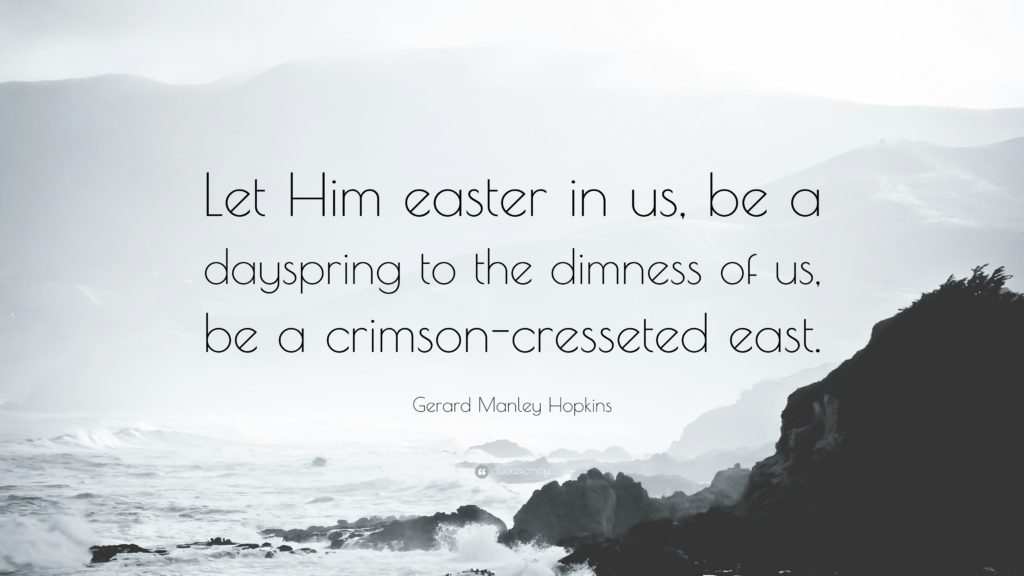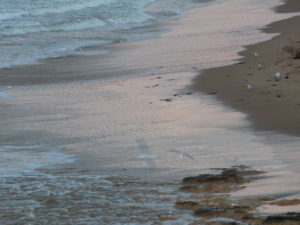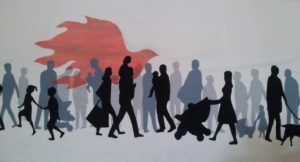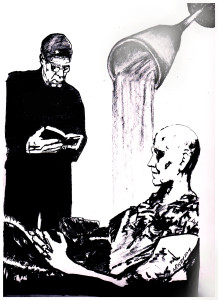
https://quotefancy.com/gerard-manley-hopkins-quotes
The Wreck of the Deuschland by Gerard Manley Hopkins
The Deuschland was a ship that ran aground on a shoal 25 miles off the coast of England in 1875. Waves battered it for 30 hours before any rescue attempt was made and, adding insult to injury, men from nearby towns looted the wreckage, taking anything of value including stealing jewellery and valuables from the bodies of the deceased.
Among the dead were five Franciscan nuns who had fled persecution in Germany and were on their way to the United States. Hopkins dedicated his poem to them with this inscription: To the happy memory of five Franciscan Nuns, exiles by the Falk Laws, drowned between midnight and morning of Dec. 7th, 1875.
‘Let him easter in us, be a dayspring to the dimness of us, be a crimson-cresseted east’ comes towards the end of what is a long poem. It’s the line that has captured the imaginations of writers and people of faith ever since because Hopkins, speaking on behalf of the British people who let the tragedy happen, asks one of the nuns to ‘remember us’ as she enters into heaven to be with the risen Christ before referencing and perhaps challenging our understanding of Easter.
Under Hopkins’s pen, Easter is no longer a noun, able to be relegated to a long-ago event. Rather, ‘easter’ becomes a verb in the present-continuous tense, something that continues to transform our present lives, to give us new life, and to offer us hope of what will happen when the risen Christ enters our lives.
This line of the poem becomes a prayer: Let Easter get into us. Let Easter come and live where we live. Let Easter permeate our souls. Let Easter expose the dimness in us and shine its light into our darkest corners.
 I rarely witness dayspring even if I am up early enough because I don’t have any east-facing windows that give me an unobstructed view of the horizon. When I first became acquainted with this poem I was attending a prayer retreat at Queenscliff. One morning, I made it my business to get up early and walk the beach in order to witness dayspring so that I could put an image to Hopkin’s prayer. I have always loved sunrises, but what I noticed on that occasion was the way in which the sky lightened and the sand and sea took on tinges of pink before I saw the crimson crest.
I rarely witness dayspring even if I am up early enough because I don’t have any east-facing windows that give me an unobstructed view of the horizon. When I first became acquainted with this poem I was attending a prayer retreat at Queenscliff. One morning, I made it my business to get up early and walk the beach in order to witness dayspring so that I could put an image to Hopkin’s prayer. I have always loved sunrises, but what I noticed on that occasion was the way in which the sky lightened and the sand and sea took on tinges of pink before I saw the crimson crest.
As we ‘let him easter in us, be a dayspring to the dimness of us, be a crimson-cresseted east’, let us acknowledge the dim places, particularly at the communal and political levels of our lives, and let us long, pray and look for the ways in which light creeps in to them, the dayspring potential for a brand new, resurrection day.

 I came across this quote from the Islamic prophet, Muhammad, when I attended a professional development day at the Islamic Council of Victoria. The event had begun at 6.00am so that participants could observe the early prayers of the Muslim day, and I wasn’t too alert as someone talked about the needs of Muslim patients in hospital. Until this quote appeared on the screen.
I came across this quote from the Islamic prophet, Muhammad, when I attended a professional development day at the Islamic Council of Victoria. The event had begun at 6.00am so that participants could observe the early prayers of the Muslim day, and I wasn’t too alert as someone talked about the needs of Muslim patients in hospital. Until this quote appeared on the screen.